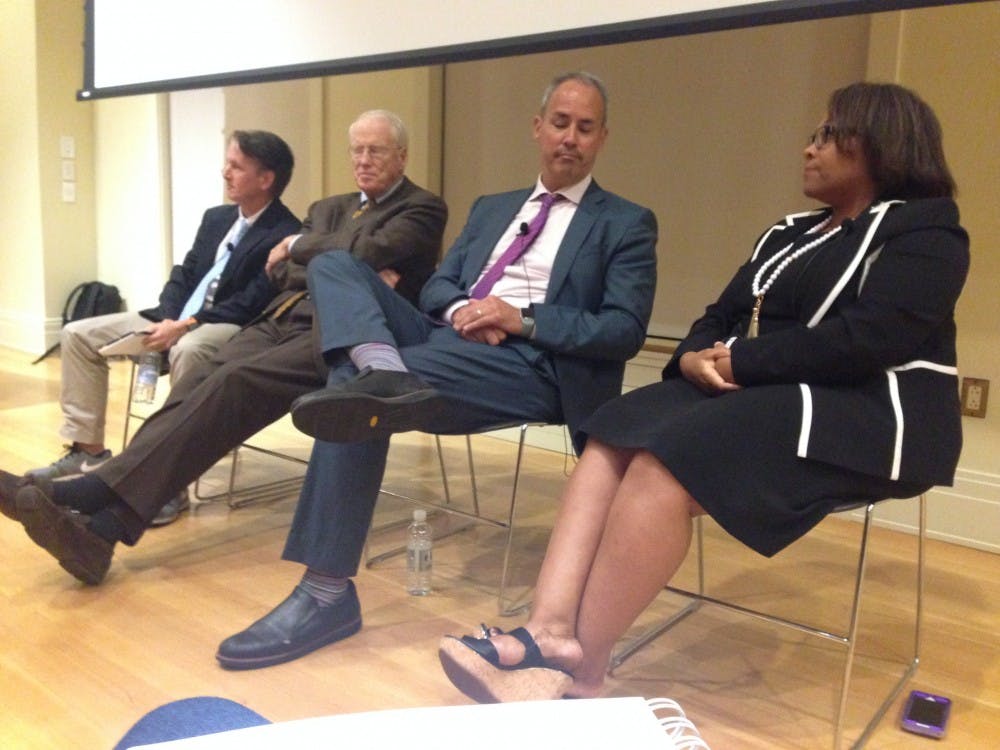The Hopkins School of Education hosted a panel titled “Transforming State Education Policy: The Money, the Policies, the Politics” to discuss Maryland education policies on Thursday, Sept. 20.
The panelists discussed an upcoming report from the Maryland Commission on Innovation and Excellence in Education. This report, now two years in the making, offers a data-based analysis of the Maryland public school system’s needs.
The panel was comprised of Commission on Innovation and Excellence in Education Chair William “Brit” Kirwan, Rutgers Graduate School of Education Professor Bruce Baker, Empower Illinois Executive Director Myles Mendoza and School of Education Associate Professor Annette Campbell Anderson.
The event began with an introduction by the moderator, School of Education Dean Christopher Morphew, followed by prepared statements from each panelist.
Kirwan discussed the mediocrity of Maryland’s public school system in state-by-state education rankings. Although he admitted that he has limited experience in K-12 education, Kirwan emphasized the importance of accountability for programs which receive state funds.
“If we don’t have a credible accountability system, I don’t think the report will be supported, and I think it probably shouldn’t be,” Kirwan said. “We have to build a structure so there is accountability on school performance and there are consequences for schools that don’t report.”
Baker spoke about the importance of school finance reform but explained that producing effective policies based on existing data can be difficult due to internal conflicts.
“[Reform] is a messy process wherever we go because we can try to round up the best possible empirical evidence, but then the best we can do is toss it into the middle of a political free-for-all,” he said.
Mendoza’s organization, Empower Illinois, provides tax credit scholarships for low-income students to attend private schools. He admitted that his fellow panelists had more expertise in the area of school finance and stressed the importance of political compromise in education reform.
Anderson, a former student of the Baltimore City Public Schools (BCPS) system, emphasized the importance of swift action on expanding access to educational opportunities for low-income students.
“For those children who don’t have access and advocates, we have to think about how we provide [supportive] resources for the students who need them the most,” she said.
Morphew then moderated the question-and-answer period of the event.
Kirwan received the majority of the audience’s questions. The questions covered teacher trainings, race as a demographic factor within the report and the growing number of English-learning students in Baltimore public schools, among other issues.
Otis Eldridge, a doctoral student in Urban Educational Leadership at Morgan State University, asked for clarification on Kirwan’s plans to increase accountability, especially in terms of the state’s role in distributing funds.
“We’re going to hold schools accountable, which makes sense, but how will we hold the people accountable for actually distributing the money to places like Baltimore City?” he said.
In response, Kirwan said that he believes schools have a responsibility to use their allocated funds to produce measurable improvements in their students’ academic performance.
“Some of the funds that we’ll be recommending won’t be allocated unless [school districts] implement the recommendations with integrity,” Kirwan said. “The commission will be recommending much broader means of, not just results on tests, but other measures of increased school performance.”
Mendoza clarified Eldridge’s question.
“If the public education system is holding itself accountable, that sounds like a centrally controlled system,” he said. “Can parents hold the system accountable with the power of exit? Can they leave when they don’t like it? If you don’t have that you’re never going to have actual accountability.”
Kirwan denied advocating for a centralized system of accountability but emphasized the importance of continuing to supervise struggling schools.
Baker then expressed his discomfort with the idea of withholding funds from schools until they implement particular programs to the state’s satisfaction.
“To say that we’re going to withhold [allocated] money until the districts have done this is to basically say we’re going to continue constitutional deprivation,” he said. “The resources need to get to Baltimore City first, and then we might want to start figuring out how we can best leverage those resources to get the job done.”
Kirwan said that he supports a greater infusion of money into the Baltimore City school system but did not elaborate on how the state could be held responsible for allocating funds under his commission’s report.
Eldridge, a BCPS graduate as well as a former teacher within the same system, expressed his dissatisfaction with Kirwan’s response.
“Dr. Kirwan kind of sidestepped my question, he didn’t really answer it,” Eldridge said. “What they’re trying to do is like telling someone to go out on a football field and be successful, but we’re not going to give you any pads, cleats or any type of equipment. You show us that you can play football, and then once you can play, we’re going to give you the equipment.”
Kaitlin Moore, a student at the School of Education, had similar reservations about the panelists’ responses to audience concerns.
“There’s a little bit of a disconnect between what the audience was asking for in terms of specific information on equity, equality and how that’s addressed in the [report], and there didn’t seem to be a clear answer on that,” Moore said.
She appreciated, however, the panel’s inclusion of a variety of perspectives.
“The panel was a really great opportunity to hear some of the more diverse voices in ed policy,” she said.
While Eldridge believed that the panel provided a useful forum for debate, he remained uncertain about what positive effects Kirwan’s commission’s report could have.
“If we can’t even get the leader of the Commission to answer a question about what ways are we going to hold the state accountable for doing what they say they’re going to do, then I can’t have much faith in what’s going to happen,” he said.





